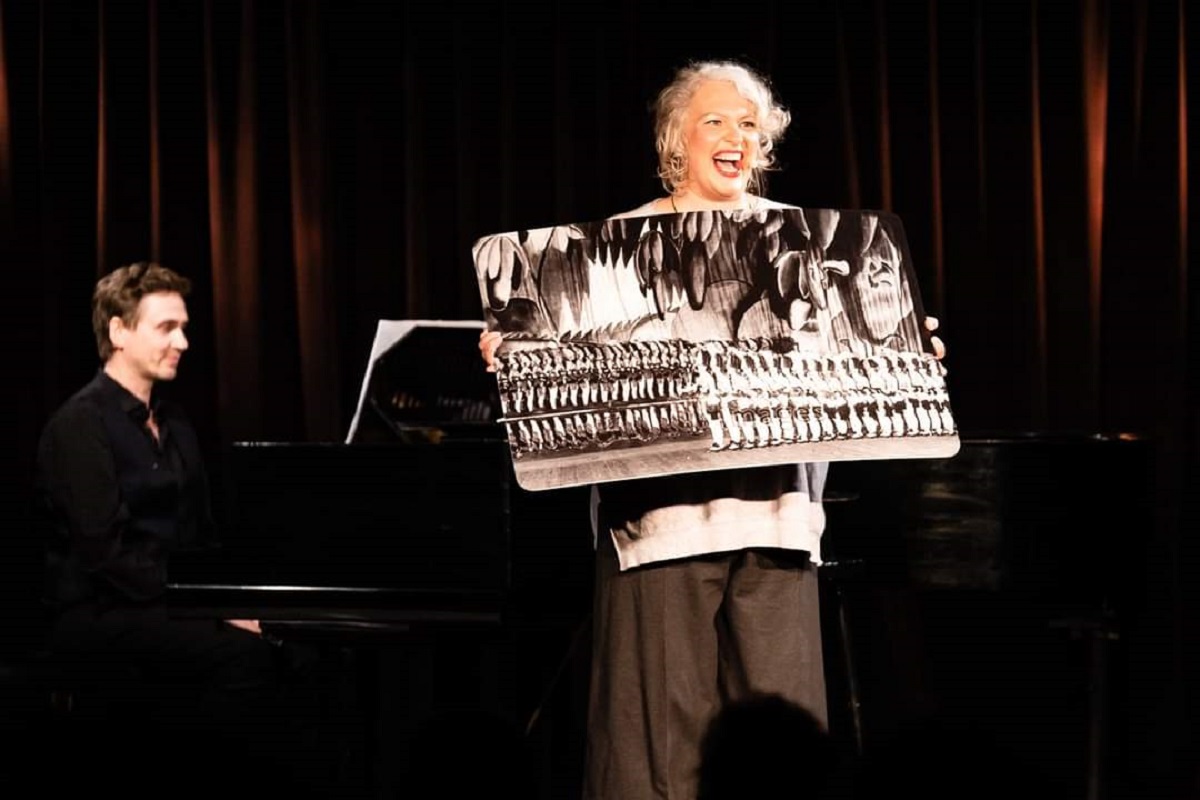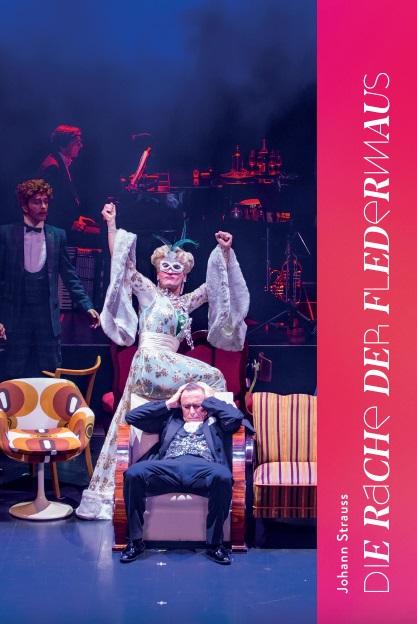Kevin Clarke
Operetta Research Center
8 February, 2023
There are no real operetta divas around anymore. Or are there? It seems that nowadays most sopranos singing the once-famous Massary or Geistinger repertoire are classically trained artists who shy away from the blatantly “naughty” way the genre was once presented, opting instead for a slightly boring focus on producing beautiful notes. But then along comes Desirée Nick and revives interest in the original glory of this repertoire and in people such as Margo Lion, Josma Selim or Claire Waldoff. Miss Nick is currently performimg at Tipi am Kanzleramt with “Forbidden Material” which includes some glorious Oscar Straus titles written for Fritzi M.

Desirée Nick singing Oscar Strauss. (Photo: XAMAX)
The secret of a successful soubrette or diseuse isn’t that she sings accurately, it’s the suggestive subtext she slaps around your ears. As a provocation but also a celebration of sexual liberation. Being provocative and sexually liberated is a trademark of Desirée Nick who rose to national fame in Germany when she participated (and won) in a reality tv format called Dschungelcamp.
She’s famous for her intelligent bitchy remarks, preferably about other reality tv stars. But she’s always been interested in doing more than just that. Even if it gets her headlines in tabloids and a regular spot on talk shows. Miss Nick has presented Johann Strauss operettas at Staatsoperette Dresden, she’s been Mistress of Ceremonies at Komische Oper Berlin for Kálmán’s Zirkusprinzessin, she also played Josepha Vogelhuber in an LGBT production of Im weißen Rössl at the opera house in Bremen.
In her new show – with queer pianist Jack Woodhead as her partner – she revives her masterful interpretation of Fritzi Massary hits, written by Oscar Straus. But in contrast to Dagmar Manzel who sings these songs regularly at Komische Oper in the Barrie Kosky production of Eine Frau, die weiß, was sie will, Miss Nick ever so skillfully adapts the famous lyrics and adjusts them to her stage persona. So instead of singing “Warum soll eine Frau den kein Verhältlnis haben?“ she chirps about the question why women today shouldn’t have any pubic hair. It’s blatantly offensive and totally over the top, i.e. the opposite of Massary. But it makes one understand the shock waves such repertoire can create. And when Miss Nick sings “Ich bin eine Frau, die weiß, was sie will“ you believe her. Because her entire stage persona is about not letting anyone put her down – ever!

Pianist Jack Woodhead. (Photo: XAMAX)
She also sings wild interpretations of “Die Kleptomanin” by Friedrich Hollaender. And she delivers long empowerment speeches between the musical numbers that are not pretty, but effective.
While some of this repertoire had been heard before, a Marlene Dietrich medley is new. Instead of delivering yet another camp impersonation, Miss Nick pays homage to Germany’s most famous film star by parodying her, but in such a way that she can actually compare favorably with the original. The low keys of songs such as “Lili Marlen”, “Ich bin die fesche Lola” or “Ich bin von Kopf bis Fuß auf Liebe eingestellt“ suit Miss Nick’s voice perfectly.

Desirée Nick as Marlene. (Photo: XAMAX)
If there’s anything at all to complain about this new show at Tipi (running till 12 February) it’s the volume. Every song is amplified in such a grotesque way that it hurts, which sadly works against Miss Nick. Because at some point the singing, screeching and the permanent insults become annoying. Purely because of the loudness. Maybe Tipi can change that? (They would do everyone a favor.)
While Desirée Nick packs them in at Tipi nightly, the much more intimate Theater im Palais in East-Berlin offered Stefanie Dietrich in Mizzi Meier: Aus dem tragischen Leben einer Lustspielsoubrette. It’s a show about the fictional biography of an operetta soubrette in the first half of the 20th century.

Stefanie Dietrich presenting the life of “Mizzi Meier”. (Photo: Anne Freitag Fotografie)
Miss Dietrich presents a mockumentary about someone who trys to break into show business and almost makes it, but then fate intervenes, again and again. Along the way you hear songs such as “Es war einmal ein Musikus” (by Friedrich Schwarz) or “Strahlender Mond” from Vetter aus Dingsda, “Im Salzkammergut” from Im weißen Rössl or Lehár’s “Meine Lippen sie küssen so heiß“, not to forget “Klänge der Heimat“ from Fledermaus, which Miss Dietrich as Mizzi Meier interprets in four totally different “styles”, with hilarious results.
In contrast to Desirée Nick the soprano voice von Stefanie Dietrick is much prettier. She’s an accomplished musical comedy actress with a winsome stage presence, singing at a “normal” volume that’s pleasant to listen to throughout. She’s also brilliant at inserting fake diary entries and other spoken texts that make Mizzi come alive for the audience.
One thing that Miss Dietrich doesn’t possess, however, is a willingness to go overboard and find the sexual side of songs such as “Ich bin die Marie von der Haller Revue” or “Was hat eine Frau von der Treue?”. Everything that’s too much in Miss Nick’s performance is sort of too little here. It made me sit through the show wondering what it would be like to put both artists on stage together, so they could inspire one another.
The one-woman-show about Mizzi Meier, with Markus Zugehör at the piano, returns to Berlin every now and then, it sometimes also pops up elsewhere. So keep your eyes open for it, it’s absolutely worth seeing and a musical delight.

Christoph Marti and Tobias Bonn on the cover of the program of “Die Rache der Fledermaus”. (Photo: Komische Oper Berlin)
While Miss Nick and Miss Dietrich offer two very different approaches to the “Fach” of an operetta soubrette or diseuse, coming up in February is a new production of Die Fledermaus auf Komische Oper Berlin with Christoph Marti as a one-of-a-kind Rosalinde. You’ll probably remember Mr. Marti from the title roles in Clivia, Roxy und ihr Wunderteam and other operetta glories. In my personal dreams the three of them – Nick, Dietrich, and Marti – would join forces one day and rock the world with a best of operetta concert and album.
Die Rache der Fledermaus premieres at Komische Oper on 10 February, Stefanie Dietrich is Prinz Orlofsky in that production by Stefan Huber, Alen Hodzovic is Alfred and Tobias Bonn is Eisenstein. Stefan Kurt plays Frosch.
